Measles in America: An Ongoing Problem
By MarkAlain Déry, DO, MPH, FACOI, Eric Griggs, MD - Last Updated: April 30, 2025The NoiseFilter podcast trio—consisting of infectious disease expert MarkAlain Dery, DO, MPH, FACOI, community health specialist Eric Griggs, MD, and co-host/producer David Roston— continue an important and timely discussion on measles, which was recorded in April, for the first time in 2025, in the trio’s hometown of New Orleans. The group discusses a case, which has been linked to international travel, and how measles is not only a national concern but also an international danger.
Transcript:
MarkAlain Dery: This is NoiseFilter, and my name is MarkAlain Dery. Today with us is Dr. Eric Griggs, who’s a community health specialist, as well as David Roston, who’s a health communication specialist and also the producer of our show. And we are going to jump right into it. We are going to be talking about measles in New Orleans. New Orleans is near and dear to our hearts. We all met in New Orleans, and right now, Eric and I live in New Orleans.
In April, Eric, as I’m sure you know, the Louisiana Department of Health confirmed the first case of the year in an adult resident of Orleans Parish. This case is linked to international travel, and, as no surprise, the patient was not vaccinated against measles. The individual who tested positive is currently in isolation in one of our local hospitals and has received treatment here in New Orleans. Fortunately, they did not require hospitalization and will remain in isolation until they’re no longer infectious. To protect the patient’s privacy, no further identifying information will be released.
Eric, thoughts?
Dr. Eric Griggs: Yes. None of this is surprising in light of what’s been taking place in the last few months. We know that last time that we reported, there were about 752 cases in the last few weeks, and that’s double—I’m sorry—it’s more than halfway to what was seen last year. This isn’t the first time that we’ve seen measles in New Orleans. The last time was, I think, February of 2019, and it happened to be two kids that had done international or out-state travel, and they were not vaccinated.
MarkAlain Dery: Yes. This is not a surprise to me as well. We’ve seen this current measles outbreak that started in Texas. It migrated over to New Mexico. And Eric, I know that on our regular radio show, we’ve been just waiting until it actually hit here in Orleans Parish or Louisiana. I just didn’t think it was going to hit so close.
What’s interesting for me, also, is just trying to figure out where this individual went. Obviously, this is information we’re not going to hear for a long time, but we do know there are outbreaks of measles throughout the world, so it’s hard to pinpoint it. But this does go to show—and before I toss to you, David—remember, this is one of the most, if not the most, infectious agent to human beings. It has a reproductive rate of 18. In other words, one person can transmit to 18 [other people].
Now, if this were somebody who was traveling, and they picked it up while traveling, imagine the role of the contact tracers and the epidemiologists that have to go backwards to trace out exactly where this individual was. Imagine being the person that just flew back. Let’s say it was somewhere to London and then London to New Orleans, that leg of the [trip]. You just were in London visiting, and the next thing you know, you were sitting three seats behind the person who had measles. That’s how easy it is for this virus to transmit and how difficult a job it is for a contact tracer.
Dr. Eric Griggs: Yes. But can we take it a step further before David gets in? Imagine that you have to do this for everybody that was in the vicinity of the space you occupied for 2 hours. It can linger in the air for 2 hours…
MarkAlain Dery: 100%.
Dr. Eric Griggs: … The respiratory droplets sit there. Can you imagine that contact tracing?
MarkAlain Dery: No.
David Roston: Yes. What’s also important to think about is that we’re talking about measles in America, but this is a global health issue, right? You mentioned it could be flying to London or flying to South America, and it’s not just an American issue. I think it’s important to talk about this. It’s similar to what we saw with COVID. Infectious diseases infect everybody, especially when they’re transmitted in this way where you can pick it up—getting it in a plane, getting it in an elevator. I just want to plant a seed there in a sense that this is not just affecting us in America, us in New Orleans or in Texas, but there’s implications in Mexico and beyond. I think it’s important to remember that.
Dr. Eric Griggs: But I want to point out something. I mentioned that it was 2019. Now, MarkAlain, you can help me here. [You’re] the epidemiologist and infectious disease, the bug guy. We had all but eliminated measles until—was it 2019?
MarkAlain Dery: 2020.
Dr. Eric Griggs: 2020. Well, the same…
MarkAlain Dery: No, no, no. 2000. Eric, 2000.
Dr. Eric Griggs: Oh, 2000.
MarkAlain Dery: In the country we eliminated measles in 2000.
Dr. Eric Griggs: Yes. And then the wave of “Don’t get vaccinated.” It doesn’t work. They [are] recirculating that paper that has been proven false—I don’t know how many times. So people started not getting vaccinated, and it came back, and it seems like we’re going through the wave of it again. And we talked before [about] how that tends to be the cycle of public health. We do too well. We do so well that, generationally, they believe that the precautions we put in place don’t work because they eliminate the dangers.
MarkAlain Dery: Sometimes our success stories are the things that bite us in the rear. We do such a good job eliminating things, people forget about it. And they never had to live [with] that fear. The generation before us had to deal with polio. Polio is a tremendous disease that paralyzed and killed people. We’ve all seen pictures of iron lungs. Your diaphragm is paralyzed. You’re not going to be able to breathe. Those iron lungs were doing the breathing for these children. We don’t have to deal with any of that anymore. We don’t have to worry about people not being able to walk. The whole March of Dimes—those kids that you always see with the crutches—that was all as a result of raising [money] for polio vaccine research, which we got. We got two great ones, and they do amazing jobs. And unfortunately, we’re victims of our own success in public health, and that can be very, very problematic.
But for us to… Dave, did you want to say something or were you?…
David Roston: No, no. I agree with all this. We take for granted so much of our public health achievements, like what we’ve done with measles up until recently. This is becoming a much more serious issue, and we’re seeing it in New Orleans now.
I’m just curious. When you talk to people in New Orleans or you talk to patients, what is the general consensus around measles? Are people taking it seriously or not?
Dr. Eric Griggs: This is interesting. You want to bring it close to home. I did. [In] my TV segment this morning, we were actually talking about COVID. What is it? The advisory council on immunization policies is meeting in June to possibly change the recommendations. They don’t recommend the vaccines for everyone over 6 months. They’re going to super-specialize it to people that are 65 and older that might be immune compromised.
The problem is exactly what we’re seeing here that’s happened in public health. We forget how dangerous these diseases are. The way to protect yourself is through the vaccines, the MMR vaccines for measles, and of course, [the] COVID vaccine for COVID, polio vaccine for polio. But the problem is we minimize their effects, and what happens is it gets into a situation where nobody believes it’s necessary, and here we are. MarkAlain, on other interviews we’ve done, I hope that you will beautifully explain again how dangerous [it is].. It’s more than just a rash, right?
MarkAlain Dery: Listen, this is a very, very dangerous disease. It can be. It’s a spectrum. It can be something as mild as some fever; cough; runny nose; red, watery eyes. That’s the main, classical outbreak that people see. Then after a couple of days, you start seeing tiny white spots called Koplik spots, and then a few days after that, you start getting the rash that starts on the face and then spreads down the body. After a few days, the fever subsides and the rash fades. Now, remember, we showed in a previous podcast that [it] could get into the lungs, and you can get pneumonia that way. But remember, viruses embed themselves, sometimes permanently into our DNA. This virus can come out later in life, maybe 10 years later, and cause inflammation of the brain called encephalitis. And in some cases—and we’re going to have a better idea about this—we went into this in some detail in our previous podcast, but you can get something called subacute panencephalitis.
Dr. Eric Griggs: Subacute panencephalitis. Yes.
MarkAlain Dery: No. Subacute sclerosing panencephalitis.
Dr. Eric Griggs: Sclerosing panencephalitis.
MarkAlain Dery: Sclerosing panencephalitis. What does all that mean? That means that it takes a long time for it to show up, it affects the whole brain, and it scars the brain. Essentially, what the measles virus does is… it can scar the brain. One day, your 12-year-old is doing well, in school plays, academically performing well, playing baseball; everything is going great; and then all of a sudden, the child starts to slump over, has no control of their bodily functions, their ability to stand; they’re in a hospital, and in 100% of cases they die. This could be a very, very deadly disease, if not taken seriously. It’s not just a rash and fever. It’s a rash and fever that could come with some very deadly complications. Go ahead, Eric.
Dr. Eric Griggs: But wait, there’s more. Can you talk about the amnesia—the immunological amnesia? Whoa. [inaudible 00:09:58]-
MarkAlain Dery: Yes. As we’re rounding third base, the other thing that, and I always forget to talk about it and I shouldn’t—and thank you for reminding me—the virus also has the ability to basically wipe out your previous immune system. Let’s say you were immunized for polio or you had a fever and cough from a previous coronavirus or a rhinovirus or whatever the case may be, and you developed immunity for that. Boom. Wipes away. All the previous vaccines that you had are wiped away. So as we’re approaching home, Cassandra moment, Eric, are we going to see more measles in Orleans Parish?
Dr. Eric Griggs: Yes.
MarkAlain Dery: I agree 100%. Dave, thoughts?
David Roston: Yes. What’s important now more than ever, as we’re seeing the rapid rate of measles hitting the US, is that if you have friends that are having kids or that are pregnant or where it’s time to have these serious talks of people that are skeptical—and we’ll talk about that in a future video—it’s really important to have these conversations and make sure that people are vaccinated.
Dr. Eric Griggs: And MarkAlain, [here is] the question that we get asked all the time: Does the protection wane? Should we, as adults that have been vaccinated, should we be talking to our doctors about titers? What are your thoughts?
MarkAlain Dery: So real quickly…
Dr. Eric Griggs: Titers are levels.
MarkAlain Dery: Titers are levels of antibodies. What Eric is talking about is if you were vaccinated as a child, you probably got two vaccines. You’re about 95% to 98% protected. As we age, we can lose immunity. For measles, not really. You should be fine. But if you are concerned, you can go to your doctors. Either [number] 1, they’ll just give you another MMR vaccine, or [number] 2, they’ll check a titer and if your titers are low… I have an autoimmune disorder; my titers were low when I checked, and so I just got a new MMR vaccine last year. So one or the other. Also, if you come into my office and you want an MMR vaccine, I’ll give it to you.
Dr. Eric Griggs: What is MMR? MMR, what’s that?
MarkAlain Dery: Is measles, mumps, and rubella.
Dr. Eric Griggs: Oh.
MarkAlain Dery: The MMR vaccine. So as we are approaching home, thank you guys for tuning in. Thank you for Docwire News. Please subscribe and like this channel and leave a comment because it helps us with the algorithm. We’ll see you guys later.
David Roston: Yes. Follow us on social media as well. NoiseFilter show. Check us out: noisefiltershow.com.
Dr. Eric Griggs: Yeah, what they said. Yeah.
David Roston: All right. Thanks y’all.

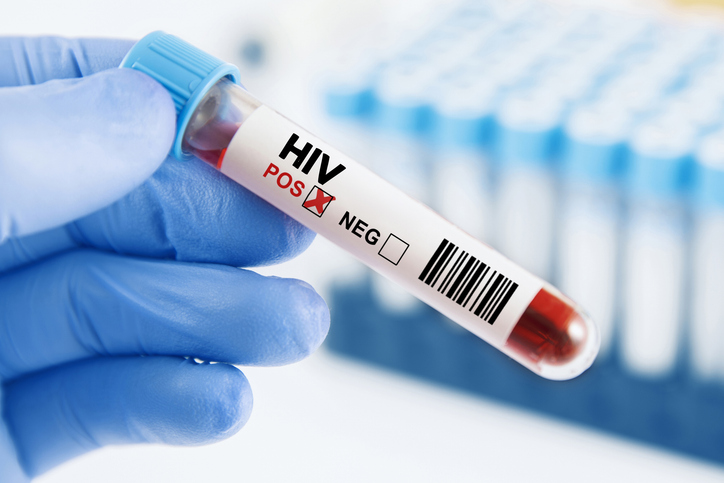
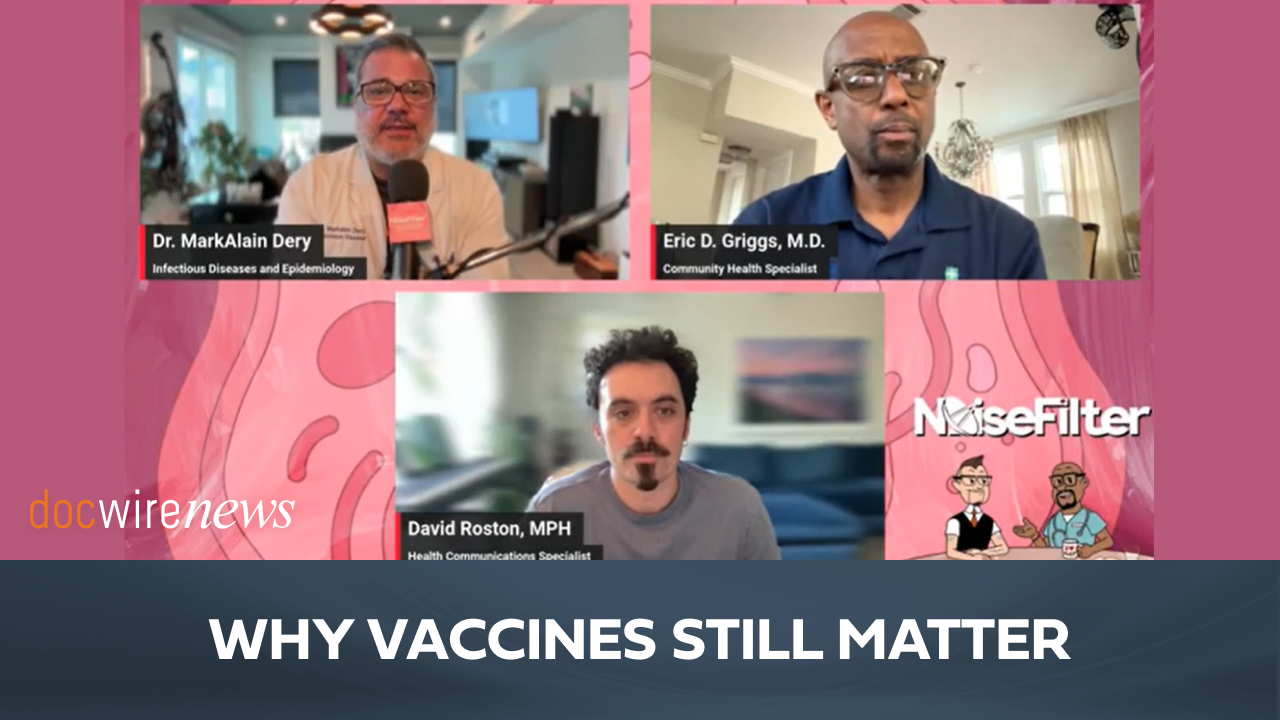
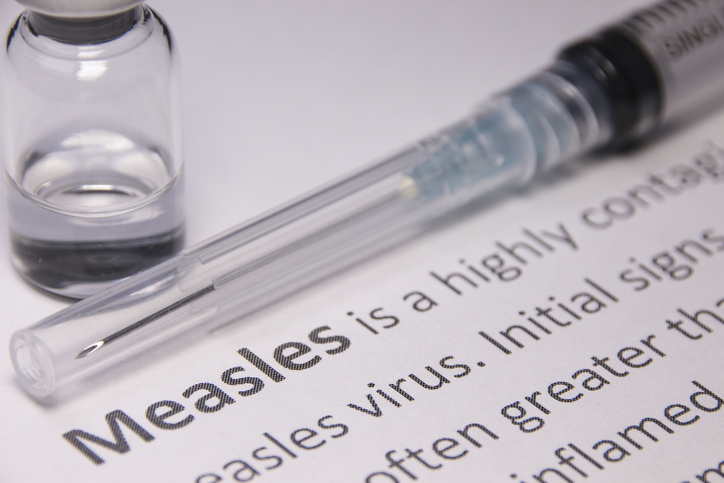
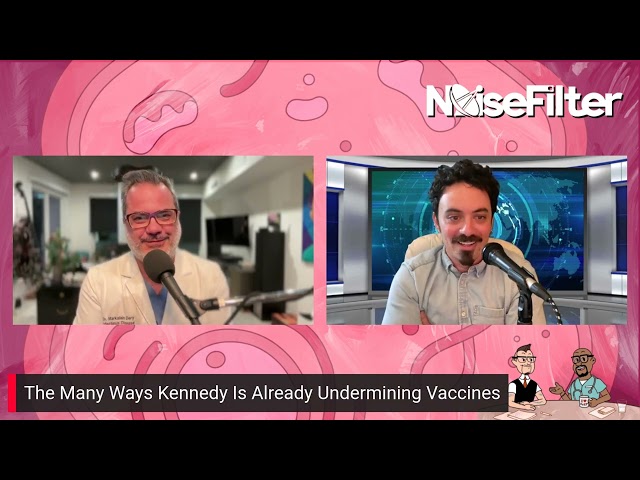
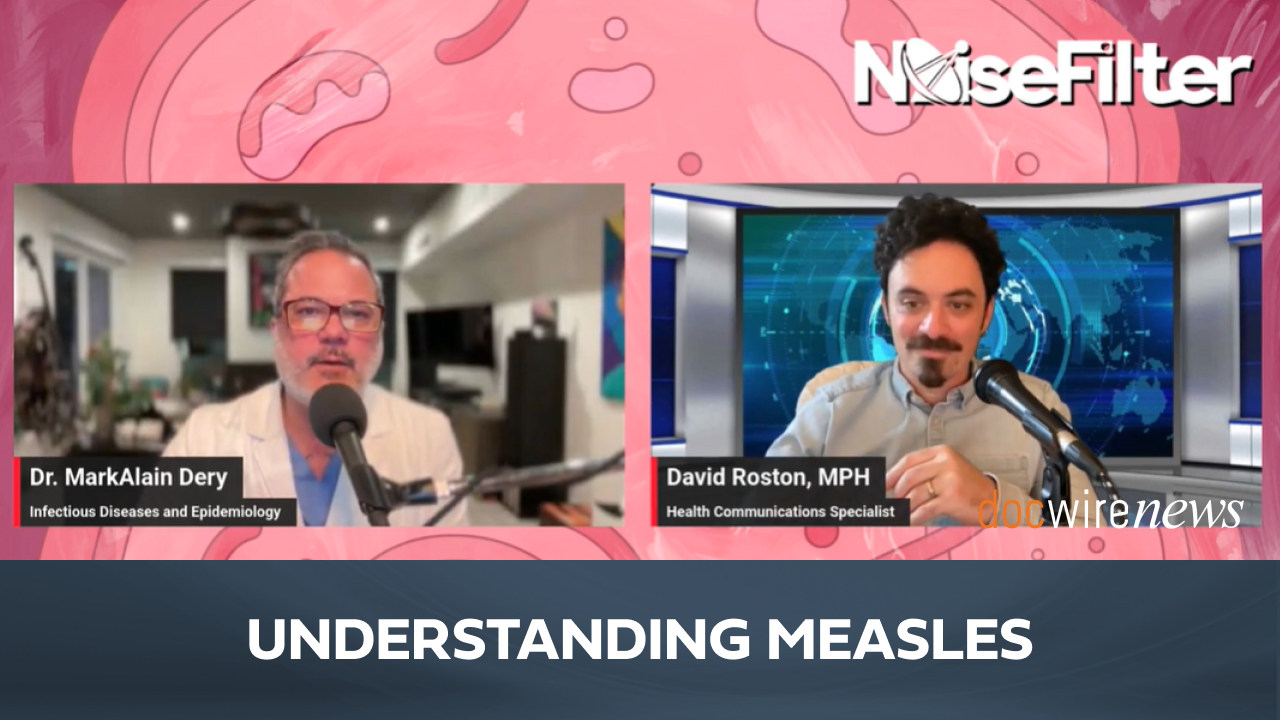

 © 2025 Mashup Media, LLC, a Formedics Property. All Rights Reserved.
© 2025 Mashup Media, LLC, a Formedics Property. All Rights Reserved.